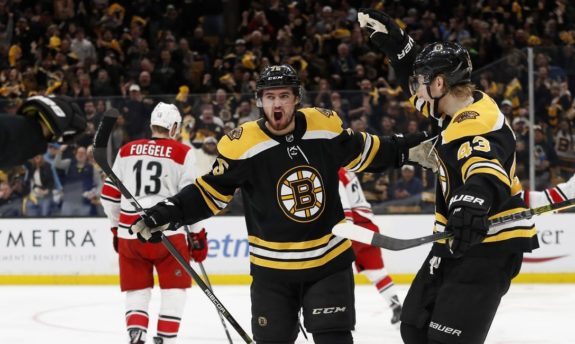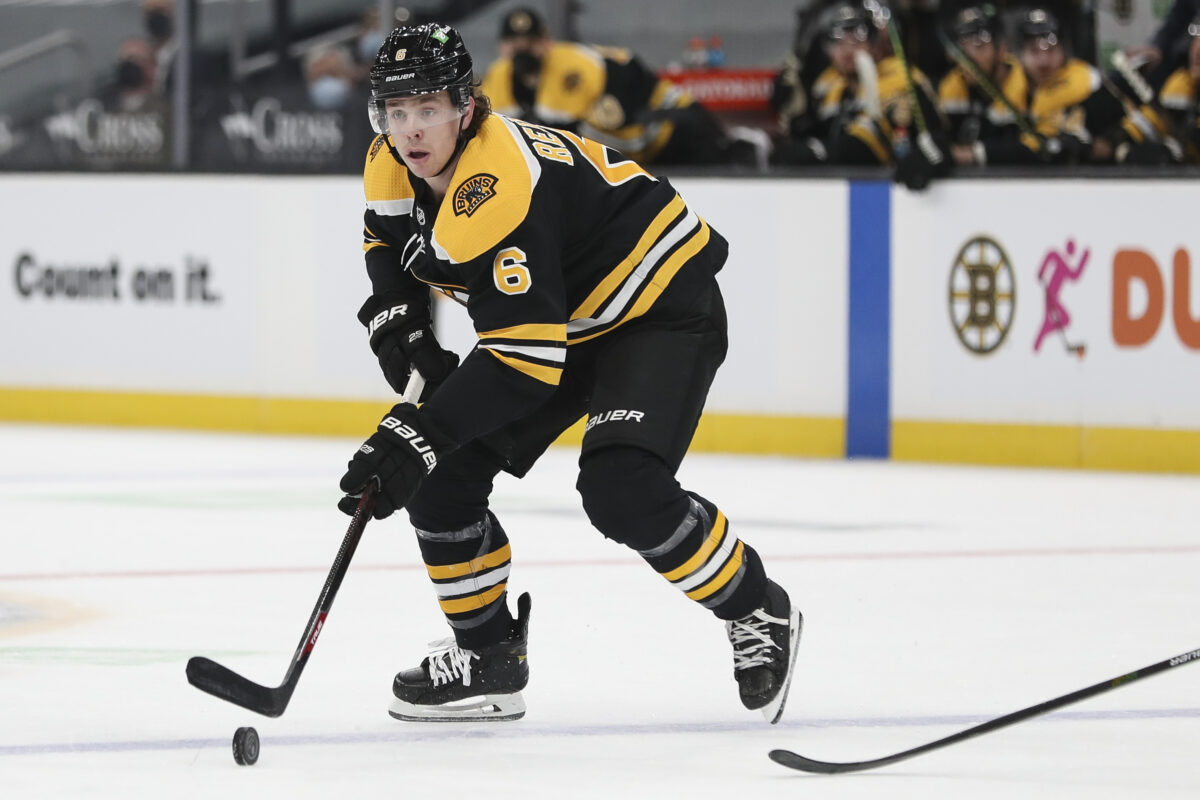There are few lineup uncertainties remaining for the Boston Bruins as they prepare to embark on their playoff run. You know the first line will be the same first line it has been the entire second half of the season (when healthy.) That goes for most of the forwards. We’ll watch whether head coach Bruce Cassidy keeps Trent Frederic in the lineup on the third line where he has been for an extended stretch of time. There are depth options with the emergence of Marc McLaughlin and Anton Blidh that could add intriguing elements on a fourth line, but neither player is expected to play in Game 1 of the playoffs for the Bruins.
Related: Bruins’ Defensive Depth Being Tested as Team Struggles to Stay Healthy
Where there does remain a question mark, and a massive question mark in most eyes, is on the Bruins’ third defensive pairing, specifically on the right side. Assuming the team enters the playoffs with a fully healthy, or as healthy as can be expected after an 82-game season, roster with a full collection of defensemen to pick from, who should be the right defenseman on the Bruins’ third pair?
The Bruins have three options to choose from without involving some expert-level lineup manipulating. The third pair will be anchored by Derek Forbort on the left side, that much is clear. His partner will either be Connor Clifton, Mike Reilly, or Josh Brown. Each player can be an acceptable sixth defenseman on this team, but none has done enough to inspire any extended amount of confidence to clearly lock up their roster spot. You could make a case that Jack Ahcan should be considered for the sixth defenseman role (I like this idea more than I actually thought I would), but a move to Ahcan would likely slide Forbert to his off-side at the right defense spot.

Without considering Ahcan (maybe his case gets his own piece? Stay tuned and find out), here is the case for each player, Clifton, Reilly, and Brown.
Connor Clifton
On the surface, Clifton would seem the likely front-runner for the position. He is a natural right shot, is a strong enough skater that he can keep pace with the forwards of a team like Toronto or Tampa Bay, and has an edge to his game that translates to a playoff-style of play. He has 36 games of playoff experience with the Bruins, half of those games coming in the 2018-19 Cup run that ended in the Game 7 loss of the Cup Final to the St. Louis Blues. There is enough offense in his game that he may sneak a goal or key assist in and could add an extra element of blue line scoring as well.

Now, the knock against Clifton. His physical edge often comes at the expense of defensive awareness and positioning. I love someone who will finish a check as much as the next guy, but he will finish a check just to finish a check, even if that decision leads to a high-danger chance in front of the Bruins’ net. The case could be made that the physical play is important to wear an opponent down in what should be a long playoff series, but if you lose early games because your third pair defenseman is dragged out of position, the attrition will not kick in.
With Clifton, there is some element of the devil you know being better than the devil you don’t. He won’t win you a series, but he also likely won’t lose you one single-handedly either. It could be worse, but Clifton does not move the needle for me.
Mike Reilly
Last year, Mike Reilly would not have been on this list. He was firmly entrenched as the Bruins’ fourth or fifth defenseman, playing on his natural left side. Fast forward to today and you see the struggles he has gone through this season. He fits the mold of a puck-moving defenseman who would match up well with the skaters of Toronto or Carolina. When playing to his true caliber, he can orchestrate breakouts from the defensive zone and help push the offense from the back end. The problem is, while this is what he can do, this is not what he has been doing. For much of the year, his play has been pedestrian at best, lacking the offensive push he has shown in the past, and mixing in some defensive lapses that are not covered by his lack of offensive output.

While having the highest offensive upside and likely being the most trustworthy defender of this group, his handedness could be detrimental to his case. Clifton and Brown are both right-shot defensemen, playing on the right side. Reilly is a left-shot defenseman who would be playing on the right side, his weak side. He has shown an ability to do this before, but it is worth noting this could prove problematic in the heightened nature of the playoffs. While Reilly matches up well with some of the better skating teams where some physicality will come into play, the series will not revolve around finishing checks and establishing a physical tone. He does not have any snarl to speak of in his game. If the Bruins draw the Lightning, a series that will be noteworthy if a single player survives the series without massive bruising from the number of checks that will be thrown, Reilly’s style will not translate well.
Josh Brown
Brown was the Bruins’ attempt at an under-the-radar trade acquisition who could add depth to their blue line. He was brought in to be a physical body who could wear down the opponent and clear the blue paint. The problem? Outside of his physicality, there is nothing special that he brings to the ice on a nightly basis for the Bruins. His skating is average at best. His positioning does not eliminate offensive opportunities for opponents. He is physical, sometimes. When he does choose to be, he is often pulled from his position to finish his check, opening up a scoring opportunity. Finally, at the offensive end of the ice, Brown has not contributed anything of note.
As if these issues weren’t bad enough, when Brown is in the lineup, he manages to find himself playing a penalty-killing role. For someone whose skating can’t keep pace with opponents, and who has been known to be pulled away from his defensive assignment, I cannot think of a worse place to see him than on the penalty kill. What’s more, is the importance teams place on special teams during the postseason. When any lead is precious, teams who find playoff success almost always have the strongest powerplay and stingiest penalty kill. Brown would not see powerplay time, but he certainly would not be helping the penalty kill. With the razor-thin margin between teams, that is not a risk the Bruins should take during the playoffs.
If the Bruins need a physical boost once a series begins, don’t be surprised to see Brown make a spot appearance. He will hit some people, hopefully not allow a goal during his shifts, and set a tone, but he should not be starting the opening game of a playoff round.
Who Should the Bruins Play?
You’ve made it this far and read all my reasons, and there is a clear-cut winner here: it depends. Yep, I am taking the cop-out approach again, but in this instance, it is fair. My answer depends on who the Bruins match up against in the first round. If they are playing a team that will not be nearly as physical (Toronto and Carolina), Reilly should start Game 1 of the series on the third pair. If they draw a more physical team (Tampa Bay or the New York Rangers) Clifton should be penciled into the Game 1 lineup. Regardless of who starts the series, I would expect to see both Reilly and Clifton in round one. Brown is a wild card, who ideally would not be needed for the series assuming everyone stays healthy.
